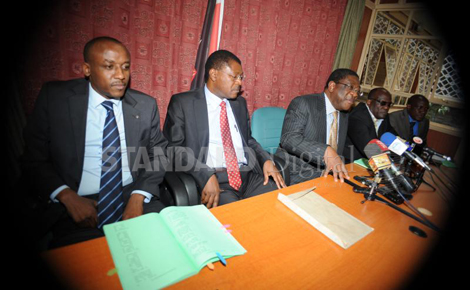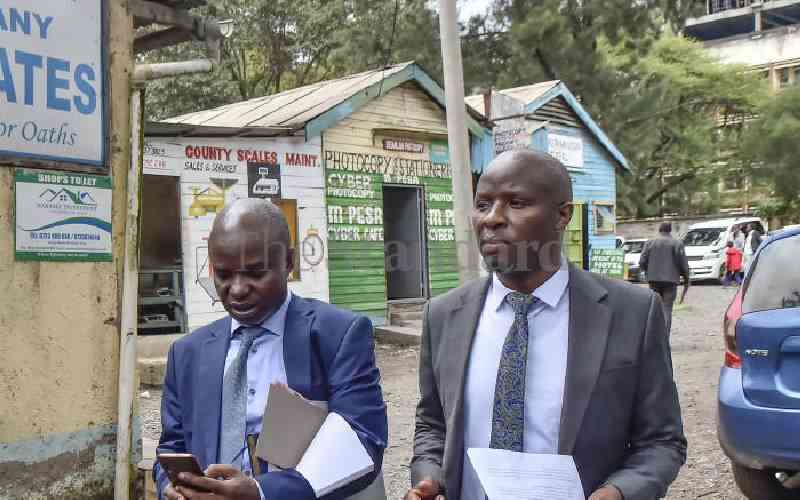 |
|
FROM LEFT: CORD senators Mutula Kilonzo Jnr (Makueni), Moses Wetang’ula (Bungoma) and Amos Wako (Busia) address the media at Parliament Buildings, Wednesday[PHOTO: BONIFACE OKENDO/Standard] |
NAIROBI: A section of political leaders Wednesday criticised the move by Parliament to introduce new anti-terrorism laws deemed oppressive.
The Opposition vowed to challenge the move in court as governors warned that the proposed laws could worsen the security situation.
Six CORD senators termed the amendments contained in the Security Laws (Amendments) Bill2014 retrogressive and an attempt to undermine the Bill of Rights.
The senators, led by Minority Leader Moses Wetang’ula, warned the National Assembly against passing the amendments, failure to which they would move to court.
“The Bill, on the face of it, is derogation on the Bills of Rights which are guaranteed in the Constitution. Any attempt to undermine the Bill of Rights will be resisted, including in the courts," Wetang'ula told journalists at Parliament Buildings.
He was accompanied by Johnstone Muthama (Machakos), James Orengo (Siaya), Amos Wako (Busia) Boni Khalwale (Kakamega) and Mutula Kilonzo Jnr (Makueni).
At the same time, the Council of Governors' chair Isaac Ruto warned that the proposed amendments will not improve the country's security but would create more dissent.
"The Government should seriously look at the problems of security and address them effectively. What the country is facing now has nothing to do with the laws," urged Ruto.
Mr Ruto, who is also the Bomet governor, warned the Government against taking away the liberty of Kenyans under the guise of addressing the runaway insecurity.
DANGEROUS MOVE
"What we are currently witnessing is a scheme to go back to the old ways and methods to restore security. These attempts are dangerous and this is not the right route to take. The Constitution heavily stresses on public participation," said Ruto.
He continued: "Let us not take away the freedom of Kenyans in the pretence of tackling security concerns."
The Security Laws (Amendment) Bill, 2014, which targets to amend 21 statutes, seeks to introduce new laws that are set to change the way Kenyans handle security and provide, among other things, sweeping powers to the National Intelligence Service (NIS) to arrest and detain terror suspects for one year.
This is seen as negating the current legal provisions that allow police officers to arrest any suspect and present the same person in court within 24 hours.
The spy agency would have powers to arrest and detain terror suspects whom the NIS officer 'witnesses committing serious offence, finds in possession of any object or material that could be used in commission of a serious offence or suspects of engaging in any act or thing, being in possession of anything that poses a threat to national security'.
Stay informed. Subscribe to our newsletter
It also seeks to give powers to NIS to tap and intercept your communication without a court order, although a similar proposal was rejected a few months ago by Parliament.
If the law is passed, the President will have powers to hand-pick the Inspector General of Police, with the approval of Parliament, removing the National Police Service Commission and other bodies any role in the competitive recruitment of the top cop.
Among the likely casualties of the Bill are journalists and Kenyans on social media who face a jail term of up to three years, a fine of Sh5 million or both for publishing or broadcasting photographs of victims of terror without the consent of the police and that of the victim.
"Any person who without, authorisation from the National Police Service, broadcasts information which undermines investigations or security operations relating to terrorism commits an offence and is liable for imprisonment for a term not exceeding three years or a fine not exceeding five million shillings or both," it adds.
The penal code is also to be amended to provide that; "A person who publishes or causes to be published or distributed obscene, gory or offensive material which is likely to cause fear or alarm to the public is guilty of a felony and shall be liable, subject to if convicted, a Sh1 million fine or imprisonment for a term not exceeding three years, while a media house shall be fined five million shillings."
This provision is targeting members of the public who share information on mobile phones and social media networks.
If the National Assembly passes the amendments, Interior Cabinet Secretary will have powers to gazette and designate areas and time where public meetings, gatherings or public processions may be held, through the amendment of the Public Order Act.
"Any person who unlawfully convenes, organises or promotes a public rally, meeting or processional or neglects or refused to comply with any law relating to public meetings commits and offence and shall be convicted. Apart from conviction, that person shall be held liable for any loss or damage as a result of the public rally."
At the same time, landlords will be required to take details of their tenants which include name(s), ID/passport number, sex, email and telephone and present them to authorities on demand while those operating accommodation facilities will be required to keep similar records of their guests and submit them to police on a weekly basis.
Those found with weapons at places of worship face a jail term of 20 years, while those in charge of the same places will be held accountable for the same with a similar jail term if convicted.
The opposition senators described some of the proposals as unconstitutional and seeking to return the country to the dark days of detention without trial and sedition, arguing this was an attempt to reintroduce some statutes that were repealed in the 1990s through the back door.
"We are slowly going back to the dark old ways if we will not be careful and the sacrifices Kenyans paid to expand the democratic space will be reversed," Orengo said.
MEDIA FREEDOM
He warned that some of the provisions, especially on media freedom, were adding more insult into injury after the National Assembly passed two other laws – Media Council of Kenya and Information and Communications Act – which contain punitive clauses that impede the working of journalists.
CORD senators accused the National Assembly leadership of sidestepping the Senate by introducing the Bill, saying Article 110 of the Constitution requires the two House speakers to consult on whether any Bill touches on county matters.
"Although national security is a mandate of the national government, it's nevertheless touching on counties and thus Senate must be involved," Wako, who is the immediate former Attorney General, said.
Senator Billow Kerrow (Mandera) argued "Significant involvement of the public in security matter will arrest the problem. The Government needs to focus more on ensuring security agencies and the local population have a good relationship to volunteer information, which would lead to the arrest of suspected criminal".
 The Standard Group Plc is a
multi-media organization with investments in media platforms spanning newspaper
print operations, television, radio broadcasting, digital and online services. The
Standard Group is recognized as a leading multi-media house in Kenya with a key
influence in matters of national and international interest.
The Standard Group Plc is a
multi-media organization with investments in media platforms spanning newspaper
print operations, television, radio broadcasting, digital and online services. The
Standard Group is recognized as a leading multi-media house in Kenya with a key
influence in matters of national and international interest.
 The Standard Group Plc is a
multi-media organization with investments in media platforms spanning newspaper
print operations, television, radio broadcasting, digital and online services. The
Standard Group is recognized as a leading multi-media house in Kenya with a key
influence in matters of national and international interest.
The Standard Group Plc is a
multi-media organization with investments in media platforms spanning newspaper
print operations, television, radio broadcasting, digital and online services. The
Standard Group is recognized as a leading multi-media house in Kenya with a key
influence in matters of national and international interest.










